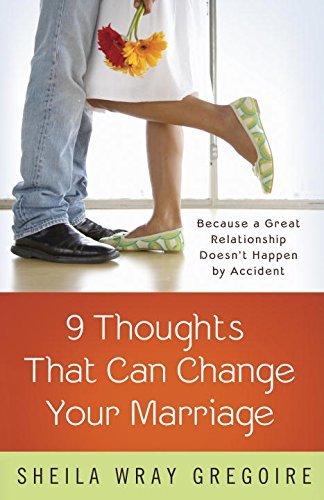Sheila Wray Gregoire's Blog, page 126
August 23, 2017
Wifey Wednesday: Discover the Happy Marriage Secret
Today’s Wednesday, the day when I always talk marriage (though, to be honest, I talk about it on most other days, too!). I’ve written over 500 Wifey Wednesday posts now, hoping desperately to help you all grow great relationships.
Keith and I truly do have a happy marriage, and I feel like we don’t work at it that much. It’s just kind of evolved, after years of making good little choices, which do add up. And we’ve confronted and dealt with some pretty huge things so they didn’t snowball.
But at the same time, I’m getting paranoid for so many people around me.
This week someone we love a lot phoned my husband and said, “Hey, can I stop by and talk to you guys?”
That sounds innocuous enough, but I went into full panic mode. I was just getting ready to make dinner, and as I was chopping up vegetables all of these scenarios were going through my head. Keith was sure it was cancer. I was sure that the guy was going to tell us he and his wife had decided to split.
You see, we’ve had quite a few conversations about cancer and divorce lately with people that started with that phone call–“hey, can I just talk to you guys for a bit?”
For the next twenty minutes I was mourning the loss of his wife in my life. I was picturing what life would be without her, and realizing how much I really valued both of them. I got all teary.
And then he got here. Turns out he was working in our home town for the day and thought, “Hey, I’d love to see Keith and Sheila. I’ll see if I can just drop by after work.” That’s it. So we had a good laugh about it and chatted for a bit and then he went home to his (very happy and healthy) wife.
I think I’m just getting really jaded.
I’ve had a lot of divorces in my circles in the last little bit, and I’m watching so much pain. Much of that pain isn’t being felt by the people getting divorced themselves (though some is). A lot of it is felt by the kids. My friends and family all have kids similar ages to my own (20 & 22), so when divorce hits, it affects these kids just as their lives are beginning.
Katie is home for a few days, and we were talking late last night about all of this. (The only time I stay up late is when my kids are home; I like to snatch all the conversation I can!). I said to her, “I just want to believe that I’m helping some people avoid pain somewhere, because it sometimes seems like those close to me are all hurting, and I wish I could have done more.”
I wonder, in so many marriages, what would have happened if I had intervened earlier (and that, by the way, is why I’m a huge advocate of marriage mentorship programs at churches done well. Here’s what I think a marriage ministry should look like).
I can’t intervene in those marriages. But I know what I would say.
Two years ago 9 Thoughts That Can Change Your Marriage was published.
 And that book really does contain the secret to a happy marriage–learning to think differently about marriage, realizing that it’s not about making the marriage strong or about making you happy. It’s about honouring God and doing what’s right.
And that book really does contain the secret to a happy marriage–learning to think differently about marriage, realizing that it’s not about making the marriage strong or about making you happy. It’s about honouring God and doing what’s right.
That may sound trite, but hear me out. When we focus on having a good marriage, too often we make marriage our idol. We start judging our own performance as a wife, and invariably his as a husband, which is a recipe for disaster already. But we also may be afraid to confront real issues because we don’t want to rock the boat and endanger the marriage. So instead things fester, for years, until suddenly they blow up, right when your kids are in their twenties.
The other danger is that we focus on our own happiness and feelings. Last night I received a comment on this blog from a heartbroken woman who married a guy with a sexual past. On his wedding night, he called her the name of one of his former sexual partners (what a terrible thing to do!). But that hurt has haunted the marriage. She hasn’t been able to move on. Sex is over. And twenty years later they’re miserable.
When we focus on our feelings, we often end up miserable.
But when we focus on God–what does God want in this situation?–things are often clarified. It’s clear how healing happens, what humility will look like, and what rebuilding trust and offering forgiveness will look like.
God can do amazing things to transform marriages, and I know that this is what He wants.
He is the author of the ministry of reconciliation, after all! And in 9 Thoughts That Can Change Your Marriage, I show you such practical tips on how you can do small things that can change your entire attitude. But I also show you how you can do big things and address those huge issues in your marriage. But it all starts by learning to be GOOD, by focusing on what is right, rather than by being NICE and by being HAPPY. It’s a whole different emphasis.
When the book launched, I ran a contest where people who bought it could win dinner with me, somewhere in the U.S.! My winner lived in Georgia, and I took she and a friend out to dinner a while ago. She had read all of my books, including the sex ones, and loved them (that’s why she was so eager to buy my new one). But this one, she said, was the best. It was the most profound. And it was what so many other marriage books are lacking.
I know many of you who read the blog haven’t actually read it, and I just want to encourage you to pick it up today.
As I was saying to Katie last night, I just hope that something I’m doing is reducing the pain in the world, because we’re seeing far too much of it up close and personal right now. This book is my honest and heartfelt attempt to help people overcome pain and truly grow their marriages!
And I have something special for you: I’ve created a FREE video course to go along with the book.
I announced it last year, but I haven’t talked about it in ages, and I think many people don’t know about it. It’s got an individual study option, or a 6-week group study option or an 8-week group study option.
The videos aren’t too long–most are around the 10 minute mark. And then there are discussion questions and personal challenges and so much more! And it’s all FREE.
A FREE video-based study that can transform your marriage--from author Sheila Wray Gregoire:Click To Tweet
If you’re starting a women’s Bible study in the fall, and you’re wondering what to study, this book can change your life!
And if you don’t belong to a women’s Bible study, what about just asking some friends to get together and do the study with you? Watch the videos ahead of time and then meet at a Starbucks to talk, or have people in to your house and have a great time there. It doesn’t have to be all formal, with a church. It can just be a bunch of friends, getting together, and talking about things that matter.
If you’re tired of feeling like your marriage is good, but not good enough…
If you’re wondering if you can ever move on from this hurt…
If you’re wondering if you can ever truly deal with this one huge roadblock in your marriage…
If you’re wondering if you can ever stop feeling constantly annoyed…
Then this study is for you!
I hope that some of what I have said has helped you avoid pain.
I really am feeling like there’s way too much pain in the world! And I know that 9 Thoughts That Can Change Your Marriage will get you on the road to a great marriage! So take a look at the book, and think about starting a study this fall. And if you do–send me some pictures! I’d love to see them. 
August 22, 2017
10 Tips to Fight Menopause and Hot Flashes in the Bedroom!
And I’ve been getting so many questions from readers lately about menopause that I thought it was time to address them! I’m going through this myself right now, and the hot flashes have been terrible.
So I’ve asked around, looked for some cool solutions (love the pun there!), and polled my readers. And I’ve compiled this list of 10 things that can really help you deal with menopause and hot flashes, with help from people on my Facebook Page.

First, what do we do about hot flashes?
10 tips to deal with hot flashes and menopause symptoms: Click To Tweet
1. Try Black Cohosh, as a supplement or as a tea
I read this one on the internet, and the reviews were so good I immediately ran out and got a bottle at the health food store.
I seriously notice a HUGE difference when I take this stuff vs. when I don’t. I just take one capsule a day, and the hot flashes noticeably decrease. You can buy them in capsule form, but often you can try to make black cohosh tea, too. The problem is just that it’s very bitter. But you can google to see if it works for you!
2. Fight Hot Flashes with Temperature Controlling Bedding
I’m a Slumber Cloud convert, too. Here’s the deal: NASA developed this fabric technology for astronauts that would regulate temperature. And then Slumber Cloud has the patent to use this technology in bedding. Here’s how they describe it:
Outlast® technology is made up of thousands of microscopic “beads” called Thermocules™. Each one of these Thermocules™ is designed to absorb, store, or release heat based on your ideal sleeping temperature. As your skin temperature increases, the technology will absorb that excess heat to reduce overheating. The technology will then store the excess heat away from your body until your skin temperature begins to drop. When this occurs, the stored heat is released back to you to keep you at the perfect temperature.
In other words–night sweats are greatly reduced! Yay!
My mother had night sweats constantly for years, and she just never slept. I wish she had had this then!
Slumber Cloud has a full range of bedding available, and they sent me their Nacreous mattress pad, Cumulus pillow, and Nacreous pillow cover, all with the Outlast technology. I spent all year when we were in our RV testing out the mattress cover. It really does keep the temperature constant. It helped me with hot flashes a ton–the mattress didn’t feel hot and sweaty. But on those cool nights it also helped me stay a little warmer.
Lately I’ve been using their Nacreous pillow with pillow cover, too. You can buy the pillow in either soft, medium, or firm thicknesses. What I notice is that it stays cool. Before I was constantly turning my pillow over throughout the night to get that cool feeling, but I don’t have to anymore. Which makes me sleep through.
(Okay, so I don’t iron my sheets. But I do make my bed! I consider that a success).
The covers work better when you pair them with the sheets (and they’re sending me some sheets to try out soon, too!). But even with your own it still absorbs the heat rather than holding it close to the skin.
Check out Slumber Cloud’s products here! And learn more about the Outlast technology here.
For Help with Intimacy:
3. Get Some Lubrication with Femallay Female Suppositories
One of the big changes menopause brings is that we’re just not as “lubricated” as we once were when we make love. You could be aroused, but you could still be quite dry. Then sex isn’t as comfortable, and you can’t feel as much, either.
Enter Femallay, with an amazing, all natural product to keep you “wet”. Made with premium botanical oils and butters, including organic coconut oil and naturally-sourced vitamin E, these will help make sex fun again without any irritation. They’re paraben-free, hormone-free, glycerin-free, and gluten-free. And they contain oils that don’t just lubricate you now; they also moisturize you and help you remain more lubricated later (that’s where the Vitamin E especially comes in!). You can choose from flavoured suppositories (which can make foreplay more fun!) and the scent and flavour free ones, too.
See more from Femallay here!
4. Think Outside the Box
Sometimes making love in the same way, at the same time, just doesn’t work anymore. One woman wrote this:
Since menopause (I’m 62) we’ve discovered that I can’t get aroused much in the mornings and my husband is useless at night. However – if we take a tumble in the sheets in the afternoon (especially after church on Sunday) it’s great for both of us! Being empty-nesters, this works great but still lock the doors in case someone pops by unannounced!
For Help with General Menopause Symptoms:
5. Clary Sage Essential Oil
Clary sage is the best essential oil for menopause symptoms, and I often put it in my diffuser, sometimes mixed with geranium and cypress (I usually do equal doses, so 2 drops of each in a diffuser). I do find that it helps, too!
6. Try Young Living’s Progessence Plus
On Facebook, a number of people mentioned specific supplements that they took. I can’t list every one that was mentioned. But one product that kept coming back over and over was Young Living’s Progessence Plus blend, as well as Lady Sclareol. If you know a Young Living rep, ask them about these products!
7. Try Plexus X-Factor Plus
The other big product that people kept coming back to on Facebook was Plexus’ X-Factor Plus. You have to take it with food, and if you have a sensitive stomach it may not be the best, but some women swear by it!
8. Eat Whole Foods
One woman said:
Eat whole foods. I was having night sweats regularly but once I dumped the process foods they only occur once in a while.
Processed foods can add to our hormonal blues because they can give us adrenal fatigue, which can make the whole hormone thing worse. Deal with it at the source, and often the problems are minimized.
It’s like eating processed foods puts you +40 on the hormonal problems scale. Then menopause puts you +60, let’s say. You may have been able to function at +40, but you can’t function at +100. Get yourself down to +60, though, and you may find it more bearable!
Oh, and many women advised dumping caffeine and alcohol, too. These definitely can contribute to menopause symptoms, and if you just can’t bear it, consider cutting down on these things you know are bad for you, anyway.
9. Dump the Processed Sugar
Along with eating whole foods, try to get rid of processed sugar as much as possible. One woman said:
Really cutting down on sugar helps lessen hot flashes. I can tell when I’ve eaten too much… they increase exponentially!
Again, processed sugar impedes our body’s natural ability to produce hormones in the right balance. When you add menopause to that, you just make everything worse!
10. Consider Going on Hormones for Menopause
Finally, HRT (hormonal replacement therapy) may be an option. My doctor won’t put me on it because I have breast cancer in my family, and that’s considered a risk factor. Some doctors are far more ready to put patients on than others, and up here in Canada you can’t just get another opinion or another referral. (But I also agree–I’m not that bad yet).
If you’re just going through agony, though, and your doctor won’t listen, and you’re ABLE to go to another doctor, then perhaps get a different opinion. As one reader shared on Facebook:
Take hormones. NOTHING else works for me. I realize there are side effects but killing someone has even longer lasting consequences.
You can’t fault her logic there. 
August 21, 2017
Reader Question: Why Can’t I Reach Orgasm Now That I’ve Hit Menopause?
In the last few months I’ve talked to three women in my social circle who say that orgasm has completely stopped once they started menopause, though it was pretty easy before. For one woman it’s been ten years now, after having a great sex life when she was younger. And I’ve had several emails along these lines:
I have had absolutley NO problem getting to climax during intercourse, at least once if it multiply times (when I am greedy). We have been happily married for 26 years. For the last month I have been totally unable to orgasm. I am totally excited and almost there…but never get there. I know it is totally a ‘brain’ thing and I am in the moment. So do you have any suggestions as to what the problem may be?
As someone who is starting menopause myself, all of these emails and all these stories from friends have made me really nervous. Is my sex life over? After all, when I did my surveys for The Good Girl’s Guide to Great Sex, I found that the best years for sex in marriage were years 16-24. After that it does take a dive. And I’m sitting at year 25 right now.
So I’ve started doing some research, in some of the gynecological journals and with some physician friends that I know. And they all say the same thing: orgasm can become harder after menopause, yes, but there is no medical reason that you can’t orgasm at all.
Let me repeat that.
Orgasm can become harder after menopause,
but there is no medical reason why you can’t orgasm at all.
Whew.
 When I was giving my Girl Talk down in Austin, Texas this year (my talk where I come into a church and and discuss why God made sex the way He did and how to make it awesome–along with a super fun Q&A), I met up with Dr. Carol Peters-Tanksley, a gynecologist who has guest posted for me before, and the author of Dr. Carol’s Guide to Women’s Health, and awesome resource of all things gynecological. It’s always fun to meet people I know online in real life!
When I was giving my Girl Talk down in Austin, Texas this year (my talk where I come into a church and and discuss why God made sex the way He did and how to make it awesome–along with a super fun Q&A), I met up with Dr. Carol Peters-Tanksley, a gynecologist who has guest posted for me before, and the author of Dr. Carol’s Guide to Women’s Health, and awesome resource of all things gynecological. It’s always fun to meet people I know online in real life!
How Can I Get a Girl Talk to Come to My Church?
 I would LOVE to bring my Girl Talk to your church! It’s one of the most fun parts of my job, and I so enjoy meeting new people and touring around.
I would LOVE to bring my Girl Talk to your church! It’s one of the most fun parts of my job, and I so enjoy meeting new people and touring around.
Girl Talk is fun, seeker friendly, and informative, and you’ll find it’s an easy women’s event to get people out to (people really love talking about sex!)
And it’s affordable, too. The ticket price can cover my fee and expenses, and it’s a great way to bring different churches together.
So while we were in line for the food (yes, even speakers stand in line for food), I asked her all the menopause and orgasm questions I could. And then we followed up with some emails. Here’s what she said:
After menopause lubrication takes longer, and with the loss of estrogen lubrication diminishes. When it’s dry, it hurts! Talk with your doctor about vaginal estradiol. And don’t be afraid using one of the many lubricants available. Your response will be much easier when it doesn’t hurt.
And then she added this:
The orgasmic peak postmenopausal women experience may not feel quite as dramatic as in earlier years, but it can be intensely satisfying. If there’s one encouragement I have for postmenopausal women when it comes to sex, it’s SLOW DOWN! Longer foreplay, more conscious attention to what feels good, alternating between lighter and more intense stimulation – you’ve earned the right to take the time and enjoy it! You have every reason to continue to enjoy orgasmic sex for as many years as you wish.
So that’s a little bit encouraging!
But if it’s totally possible to orgasm, then why do so many women stop? I’m going to paraphrase her for a minute, mixed in with some other stuff I’ve read.
Has orgasm come to a screeching halt after menopause? How to enjoy sex again: Click To Tweet
Why is Orgasm Difficult After Menopause?
Menopause affects several things:
Our hormone levels change
Blood flow to the genital area reduces (and it’s blood flow that causes things to enlarge and become aroused)
Lubrication diminishes
What this adds up to is that:
Women take much longer to get aroused (because of hormone levels)
When we are aroused, we aren’t as “wet” (because of lubrication issues)
When we are aroused, it often isn’t as great, and it’s harder to cross that threshold (because of blood flow issues)
Now, I realize that’s a vast oversimplication of how arousal after menopause works (and I know they’re all linked to hormonal changes, not changes on their own), but bear with me for a minute. What Dr. Carol is saying is that this doesn’t add up to an inability to orgasm; it just means that it may be more challenging.
Why Can Some Women Orgasm After Menopause and Some Women Can’t?
Why can some women orgasm after menopause and some can't? Here's my theory:Click To Tweet
 So here’s the weird thing: these hormonal and blood flow changes happen to everyone. And yet some women have no problem with orgasm after menopause, and some women do. When I did my surveys for The Good Girl’s Guide to Great Sex, it wasn’t like nobody had an orgasm once they hit menopause. There was just a drop off. In years 21-29, for instance, 60.9% of women said that they usually or always had an orgasm when they made love. After thirty years it became 44.7%. So a definite drop off–but not everyone.
So here’s the weird thing: these hormonal and blood flow changes happen to everyone. And yet some women have no problem with orgasm after menopause, and some women do. When I did my surveys for The Good Girl’s Guide to Great Sex, it wasn’t like nobody had an orgasm once they hit menopause. There was just a drop off. In years 21-29, for instance, 60.9% of women said that they usually or always had an orgasm when they made love. After thirty years it became 44.7%. So a definite drop off–but not everyone.
What Else Does the Good Girl's Guide to Great Sex Teach?
 Ever wondered if you’re weird when it comes to sex? What do other women experience, anyway?
Ever wondered if you’re weird when it comes to sex? What do other women experience, anyway?In The Good Girl’s Guide to Great Sex I share all the research results I got after surveying over 2,000 women–women just like you!
I share who is most likely to reach “The Big ‘O'”, how often people make love, what impact age and years of marriage have, and even how guys feel about all of this.
Most importantly, though, I don’t just tell you what other people experience. I tell you how to have great sex the way that God honestly wants for you.
Find out more, and let The Good Girl’s Guide help you!
And yet these women weren’t saying that they only sometimes had an orgasm. They were saying they never did. How can that be?
I have a theory about this.
Orgasm After Menopause Becomes More Brain Focused than Body Focused
One of my friends who is really struggling described it this way:
It never used to be an issue for me at all! But now I’m finding that when my mind wanders I can’t get my mind focused again and arousal just stops. It’s like I have to concentrate. And my husband keeps saying, ‘Did I lose you? Where are you?’
I know that she and her husband have always had a great and active sex life, sort of like our letter writer there. But now she’s finding that her main battle is keeping her brain engaged.
For some of you, that doesn’t sound so weird, because you’ve been battling to keep your brain engaged for years already! In fact, that’s one of the huge things I talk about in my Boost Your Libido course–how we have to concentrate in order to feel aroused.
Some women, though, never really struggled with orgasm earlier in their marriage. And now they do.
So here’s where my special theory comes in:
I think that women who struggled with orgasm earlier in their marriage don’t have a big problem with orgasm after menopause, because for them orgasm is more brain focused already. Women whose bodies were responsive right out the gate when they got married, though, often struggle with orgasm after menopause because their sexual response was more tied to their body than their brain, and now their body isn’t cooperating.
In other words, some women have a hard time EARLY in their marriage. But because of the work they did figuring out how to orgasm and how to handle arousal, menopause isn’t as big a deal. Some women have an easy time EARLY in their marriage, but then when menopause comes, they have to relearn everything. They have to learn to make sex more brain focused than body focused.
They have to learn all of those things many wives already learned–about how to keep your mind focused; how to think sexually confident thoughts while you’re making love (like “I can turn him on!”, or “X makes me feel great!”); how to focus on certain body parts to enjoy the feeling.
So What Do You Do to Help with Postmenopausal Orgasm?
1. Keep your mind focused
Your body isn’t going to just carry you along anymore. You have to carry your body along.
2. Use a lubricant
These make sex feel luxurious! One of the great sponsors of my blog is Femallay, who has amazing vaginal suppositories that you insert just before sex, and that melt quickly and make you lubricated not just in the outer area but deep inside, too. And this means that you get far more feeling and sensation when you’re making love.
I’ve had readers write me back and tell me that they just love these! And their husbands do, too.
You can get them in one of twelve different flavours:
Or you can get it flavourless:
Check out Femallay here! They have awesome natural products for women (including natural menstrual products, too).
3. Talk to your doctor about topical hormonal creams
These aren’t lubricants, but instead creams that can help with blood flow to the area. If the problem is more that arousal starts but then comes to a standstill, then these creams can help you overcome that hurdle.
4. Relearn how to have sex after menopause
The commonality between my letter writer and all of my friends is that sex was really easy for them beforehand. I know there are some women who stop orgasm after menopause who struggled with sex earlier, too, and who never quite managed to figure it out, but often the problem seems worse for people who thought they had it all figured it out.
Now it doesn’t work at all anymore, and they thought they were good at this.
You just have to go back to square one and figure out how it works for you now, as if you’re starting all over again. Don’t think, “but this should work! This always works!” Your body is different now. That doesn’t have to be a bad thing. But you may have to relearn what helps, and that may mean taking a LOT of time on foreplay. Even read this post from my friend about how she finally reached her first orgasm after she got married. You’re starting over, too.
I know menopause can be really, really lousy. I’m finding sleep is really hard! But when we think of it as relearning rather than just trying to get back to what it was, that really can help!
Tomorrow I’m going to share 10 things that can help with menopause symptoms, including some tips I got from many of you! But for today, remember: everything is likely new right now, because your body is different. Don’t give up because things have changed. Just make it a fun research project for your husband and you!
The post Reader Question: Why Can’t I Reach Orgasm Now That I’ve Hit Menopause? appeared first on To Love, Honor and Vacuum.
August 18, 2017
Teach Your Kids to Cook: Raising Responsible Adults
I’ve been thinking about that question a lot lately as I’ve been talking to my girls. We’re working on a BIG project–It’s called “The Whole Story”, and it’s a course that helps moms tell their daughters about sex, puberty, and growing up. My girls do the videos for your girls explaining everything, I do the videos for the parents, and then there are tons of checklists and mom/daughter date ideas and more! It will launch the week after Labour Day. But we’ve been working behind the scenes to make it happen.
Then on October 3, my daughter Rebecca’s book Why I Didn’t Rebel officially hits bookstores!
So the three of us have been talking about their childhoods and about parenting almost nonstop for the last few weeks. And one theme that we keep coming back to is how important it is to teach your kids to have basic life skills.
When we think that we’re raising kids, then we go out of our way to protect them, to comfort them, to do great things for them, to make sure that they have a good life. When we think that we’re raising adults, then we go out of our way to make sure that they’re equipped so that when they leave home, they’re ready.
One parenting style is focused on the here and now; one is focused on the future.
Which one are you?
I think the two most important skills that we can give our kids is teaching them how to handle money and how to cook. If they can do both of those things, they’ll be so much further ahead!
And so I thought about the posts that I’ve written about those things in the past, and I thought that today I would point to some great ones on money, and then rerun the one about cooking, because it’s important!
Teach Your Kids About Money
7 Ways to Teach Your Kids What Life Costs (with a downloadable backwards-budget salary builder)
How a Clothing Allowance Works
Teach Your Kids to Cook
Here’s what I wrote last year:
Cooking is the one skill everyone must have before they leave home.
'Every kid should know how to cook before they leave home. Does yours? 'Click To Tweet
There are others, too, like how to manage your money or how to navigate public transit. But, seriously, everybody needs to know how to cook. It’s healthier, it’s cheaper, it lets you be hospitable, and it’s far more conducive to good family life when they do get married!
Here’s one of Katie’s posts from Instagram shortly after she moved out last year:
THAT was a proud Mommy moment!
Katie claims I started teaching her to cook breakfast when she was 6, and she had to make the pancakes because I was too lazy. That’s not how I remember it, but that’s her story and she’s sticking to it.
But the fact is that the girls were helping me around the kitchen when they were really young. Even though they sometimes (okay, often) slowed me down, I figured:
It helped us have mommy/daughter time
They learned some important lessons
We could do math in an interesting way (measuring cups!)
They were more likely to eat what they cooked
Eventually they’d master this stuff and then I’d get a break!
That last one was especially important for me. And you know what? It happened! By the time they were 11 and 12 they were making dinner occasionally, and I had the night off. Here’s Rebecca at 15 making dinner!
Now, I had all girls, but I think this is just as important if you have boys. EVERYBODY needs to know how to cook, because even if you’re married, there are times when everyone will have to cook for themselves. You can’t rely on someone else, and to believe that the spouse will do all of the cooking puts an undue strain on the relationship before it even starts! Now, I do do most of the cooking because I enjoy it and that’s how Keith and I have divided up tasks. But if Keith had to make dinner–he certainly could. So teach your boys to cook!
'The best gift you can give your future daughter-in-law is a son who can cook!'Click To Tweet
And with school starting again, I think this is a great time of year to start planning for it. How are you going to teach your kids to cook? When? It won’t just magically happen without a plan!
That’s where Kids Cook Real Food comes in
(affiliate links follow)
If you want to teach your kids how to cook, but you have no idea how to start, Katie Kimball has created the Kids Cook Real Food online course where you watch videos of her actual kids cooking (they range in age from about 4 to early teens, so there’s a good mix), and then there are learning objectives and recipes for each lesson. Kids learn how to wash and cut produce, how to use spices, how to measure, how to bake, and so much more!
And Katie (Katie with the ecourse, not my daughter Katie) focuses on cooking “real” food, not just learning how to make spaghetti from a jar or a can. She shows kids how to make food from scratch–and how it really isn’t that hard.
Katie says:
We’ll provide everything you need to get your kids from kitchen assistants to independent cooks – and you get to have fun in the kitchen.
Plus, this is finally a class that all your kids can do together – no more trying to find time to meet the needs of each age individually. You can all spend time together AND have a final product that you can eat for dinner.
There’s no fluff, no games, and no glitter.
Promise.
And she means it, too! I’ve taken a look at all these resources, and they’re really comprehensive. And really fun! I know my kids would have loved this.
Check it out here!
Leanne Seel, one of my blog readers, was actually the one who told me about this amazing course (seriously, my blog readers tell me about the coolest stuff!). (Full disclosure: I’m an affiliate for it now, but only because I legitimately love it! I’m totally on board for ANYTHING that helps kids learn to be responsible and stops mom from feeling like a maid.) Leanne’s been working through the course with her kids, and here’s how she explains it:
The Kids Cook Real Food eCourse is a multimedia online course designed to help adults teach kids to cook. It includes videos, PDF files, printable graphics, and recipe ebooks.Course creator Katie Kimball is absolutely brilliant in how she’s put this together. She walks you through exactly what you need to do, making the lessons easy to implement and fun to do.
My kids love “Mrs. Kimball”. They cheer when I tell them it’s time for their cooking class. Seeing other kids demonstrating the skills in the videos is really motivating to them, and they use every opportunity they can to practice their skills both during the lesson and afterwards.
I have saved so much time in the kitchen by using this course! I invest less than an hour of my time for each lesson, and the payback is immediate. My kids have learned to make their own healthy snacks so I don’t have to. They wash the produce for salad while I chop, cutting the prep time in half. This week, our lesson is on sharp knife skills so very soon they will be able to take over more vegetable chopping.
It really is awesome.
But you know what often stops us? Dinner time is too rushed. We don’t have time to incorporate cooking skills into an evening. We don’t have time to have kids underfoot in the kitchen. We’d rather they just play by themselves and let us get the meal on the table so we can get on with the important stuff of living.
But what if teaching your kids to cook IS the important stuff of living?
Seriously, isn’t it more important than a karate class? Than swimming lessons? Than having play time?
It helps you spend quality time with your kids where they’ll have your attention. It helps them learn such an important life skill. And it helps them eventually take over those tasks so they learn to be responsible and contribute to the household.
Any time you’re teaching something it’s going to be some work. But if pays off big time once they can do it! And imagine how grown up a 10-year-old will feel knowing that they can make a meal all by themselves?
At our house, my goal was to make sure the kids could cook 7 meals when they left home–one for every night of the week–without even a recipe. And one of those meals had to be something fancy, like Thanksgiving Dinner! But you know what I found? Once they got the concept of cooking, it wasn’t just 7 meals. Now everything is open for them! (Seriously, Rebecca even makes her own vegetable and chicken stocks!)
School’s about to start, and whether your kids are in public school, private school, or homeschool, it means that life will get hectic. Now’s the time when YOU are setting the schedule for the rest of the year, deciding what activities you’ll be doing, when you’ll be doing homework, what chores kids will be doing.
Can I suggest that you take one night a week and call it “cooking class night”? Your kids will love it. You’ll love the results. And your kids will know how to cook when they leave home! It’s a win-win.
Check out Kids Cook Real Food here!
Now tell me: Do you think there’s a difference between raising kids and raising adults? What are you doing to raise adults? Let’s talk in the comments!
The post Teach Your Kids to Cook: Raising Responsible Adults appeared first on To Love, Honor and Vacuum.
August 17, 2017
3 Truths to Teach Your Girls About their Bodies
Right now my daughters are putting the finishing touches on an online course that moms can use to help teach their daughters about sex, puberty, and growing up (you’ll hear all about it in about 3 weeks!) And so we’ve been having all these conversations back and forth about the real messages that we want young girls to understand. So this has been foremost on my brain during the month of August.
Then I heard that my friend Terri Lynne Underwood has just written a great book called Praying for Girls. I met Terri Lynne at a blogging conference a few years ago, and we had some great chats!
So when I heard that Terri Lynne’s book was coming out, I invited her to talk to us today about how to teach our daughters to appreciate their bodies. Here’s Terri Lynne:
Crooked teeth, bottle-cap glasses, and frizzy hair. That’s what she saw in the mirror. It didn’t matter that she’d long since had her braces removed, gotten contacts, and learned to style her thick hair. The mirror in the bathroom might have shown the girl she was now, but the mirror in her heart could only see what she’d been.
Even now, that girl occasionally looks in the mirror and sees the twelve-year-old version of herself. I know, because I’m that girl. And maybe you are too.
As a woman, one of my biggest struggles is not focusing on my body and how I feel about it. As a mom, one of my biggest desires is teach my daughter not to do it either.
At seventeen, my girl is past the braces and awkwardness of her tween years. But the doubts and insecurities about her appearance are still very real. As we’ve shopped for school clothes over the past few weeks, I’ve been reminded just how much what we think we see in the mirror can impact what we believe about ourselves.
What can we do as moms? How can we nurture a biblical view of body image in our daughters?
As I’ve prayed for my daughter (and her mom) to see herself the way God sees her, there are a few foundational truths I return to time and again.
3 ways to help our daughters seek their identity in God, not their looks: Click To Tweet
1. We are fearfully and wonderfully made.
Psalm 139:14 is one of the verses often applied to discussions with girls about their bodies. I have used it myself countless times to point my daughter back to the truth that her body, like her heart and mind and personality, has been carefully designed by the Creator. But I’ve also learned to remind her about the ways our bodies will change and shift (and sag) over the course of our lives. I want to remind her not to give her physical appearance more emphasis than it should have.
2. Our bodies are the temple of God.
We need to be faithful stewards, taking care of our bodies. I know for myself, and I’ve observed in my daughter, when she is eating well, exercising regularly, and getting enough rest, her concerns about her body are less prominent in her thoughts. Training ourselves to remember our bodies as the dwelling place of God (1 Corinthians 6:19) helps us keep our focus on Him. Encouraging our daughters to be attentive to their health and wellness is an excellent way to guide them to a healthy and biblical view of their bodies.
3. We are made in the image of God.
Of all the things I want my daughter to understand about herself, knowing she is made in the image of God is paramount (Genesis 1:27). Every lie our enemy and the world will try to force on our girls is rooted in that same question the serpent posed to Eve in the garden, “Did God actually say …?” (Genesis 3:1). When our girls understand and believe they have been carefully made in the image of God, that He lovingly formed them, and that He has a unique and good plan for their lives, their confidence will come not from their appearance or abilities but from His Word.
Every day our girls are bombarded with pictures of women who have been airbrushed, styled, and surgically enhanced. And every day they look at the face in the mirror and wonder if it’s enough. Our girls need us to give them biblical truth—to say to them, time and again at every age, “God really did say you are made in His image, and that image is very good.” And to pray for them, time and again at every age, to absorb the truth they are “fearfully and wonderfully made” by the God of all creation (Psalm 139:14).
Question: What are Scriptures you have used as a foundation for your prayers for and conversations with your daughter about her body image and view of herself? Let’s talk in the comments!
{This post includes excerpts from Teri Lynne’s new book, Praying for Girls: Asking God for the Things They Need Most, now available at LifeWay and Barnes & Noble as well as all major online retailers.}

 Teri Lynne Underwood is a pastor’s wife, ministry speaker, and Bible teacher. As the mother of a teenage daughter and the founder of www.PrayersforGirls.com, Teri Lynne is a cheerleader for girl moms and the author of Praying for Girls: Asking God for the Things They Need Most.
Teri Lynne Underwood is a pastor’s wife, ministry speaker, and Bible teacher. As the mother of a teenage daughter and the founder of www.PrayersforGirls.com, Teri Lynne is a cheerleader for girl moms and the author of Praying for Girls: Asking God for the Things They Need Most.
The post 3 Truths to Teach Your Girls About their Bodies appeared first on To Love, Honor and Vacuum.
August 16, 2017
Wifey Wednesday: How Can We Talk About Male Victims of Emotional Abuse?
Every Wednesday on this blog for almost ten years I’ve talked marriage. And today I want to look at the darker side of some marriages.
I’m very passionate about helping women see the truth about the destruction that emotional abuse causes. I’m a firm believer that much of the crisis of abuse in the church comes because people misunderstand what marital submission means, and then say that she should stay in an abusive marriage because he is the leader.
But at the same time, I don’t think abuse is the actual problem.
Similarly, I’m very passionate about stopping sexual assault. I believe that sexual assault is one of the worst kinds of crimes, because it hits at the very centre of our identity.
But I also don’t think sexual assault is the problem.
I think sin is the problem.
We live in a world where pride and selfishness reign. Because of that, it is hardly surprising that many women are victims of sexual assault, and many wives are victims of emotional abuse. Indeed, that was one of the results of the fall–“your desire will be for your husband, and he will rule over you.” One of the curses that women endure, and that Jesus came to reverse, was that evil men would often dominate and hurt women.
But it is not only men who sin. Women sin, too.
When I was homeschooling my girls we read Uncle Tom’s Cabin together, the classic novel about American slavery. I expected it to be caricature of southern life. Instead I was blown away by what was probably one of the top 10 novels I have ever read. What made it so powerful, though, was that not all good characters were black and not all bad characters were white. Some white characters were good; some could have been good, but they were just too weak; and some were downright evil. The evil was not all the same, either. Some were outwardly abusive, and some were just simply mean and entitled. It was the same with the depiction of the African American characters. Some were selfish. Some were lazy. And some were the absolute best depiction of real grace I have ever read.
In other words, it was just like real life.
The problem, you see, was not racism itself or the quest to dominate. The problem was sin.
Sin comes in all forms, and people will sin in different ways. No one group is perfect while another group is all bad.
That’s why I don’t want to pick sides on this blog, unless that side is simply standing with Jesus
I want to see marriages transformed, and the only way that happens is when the individuals in the marriage are transformed to look like Jesus.
Because I want to see marriages transformed, I naturally end up talking about abuse issues. That makes some people uncomfortable, especially people who are big proponents of . (And I have a big post coming up next week that will challenge some of these people!).
And yet I also get criticized by the feminist camp, especially when I say that women sometimes claim abuse just to get out of an unhappy marriage. I know many families where abuse was present; and I know many families where women claimed abuse and tore their families apart for selfish reasons. Both things can be true at the same time–women can be abused, and women can improperly claim abuse–because the root problem is not abuse. It is sin.
And so with that HUGE preamble, I want to talk about something else I see: women can also be the perpetrators of emotional abuse.
I believe that emotional abuse is a worse problem for women in the church than for men, because many misinterpret Scripture to support husbands emotionally abusing their wives. Add to that the fact that most men are physically stronger than most women, and that most women are at a financial disadvantage in their marriages, and abuse in general is a more acute problem for wives than for husbands.
Nevertheless, that does not mean that men are never victims of emotional abuse. Many men are living in marriages where they are constantly criticized and yelled at; where their wives throw things and swear profanity at them; where women deny sex for years on end, and tell men they have no recourse. And for these individual men, those marriages are torture indeed.
I don’t think the church has adequately addressed this at all. When a woman goes to a counsellor and explains symptoms of what is obviously emotional abuse, some counsellors will recognize this (though not all will) and will endeavour to help her. We have a big awareness of what abuse against women looks like. When men go in and describe the same symptoms, though, in general they are not given the same level of help. They are told they need to love their wives more as Christ loves the church; that they need to learn to communicate better; that they need to learn to forgive.
We simply don’t know how to help men whose wives are narcissistic or evil.
Then there’s the issue of withholding sex for years on end.
I want to say something else controversial today. Though I know of men who are victims of verbal abuse in marriage, what I have seen more commonly, largely because of what I write and speak about, are men who are victims of emotional abuse because their wives have completely cut them off emotionally and sexually.
At one of the marriage conferences my husband and I spoke at, we were approached by a man who had been married for 25 years. When their last child was born, ten years ago, his wife came to him and told him that now the sexual side of their marriage was over, and he would have to get used to it. I hear from men who earn all the income in the marriage, who help around the house as much as they can, who volunteer in church–but whose wives won’t even sleep in the same bedroom, won’t talk to them about anything important, and haven’t had sex in years. The men have tried seeing pastors and counsellors, but the wives refuse to go. This is simply not acceptable.
And when the men seek help, it is assumed that the men have somehow caused this. Were they mean to their wives? Did they ask for all sorts of weird things in bed? Did they pressure her too much? It must be his fault!
I do believe that we should examine ourselves and be sure that we aren’t in the wrong. I do believe that we are to take the plank out of our own eye before we deal with the speck of dust in someone else’s eye.
But I also believe that some actions rise so much to the level of abuse that to ask someone what they did to cause it is incredibly hurtful.
When a woman has been physically slapped and punched around, we now know enough (at least I sure hope we do) not to ask what she did to cause it. But when a man has been so cut off from from emotional intimacy that he is completely rejected sexually by his wife, we tend to blame him. We don’t recognize how hurtful this blame is.
Certainly there may be good reasons why a wife may withhold sex: physical pain; emotional turmoil; abuse in the marriage; chronic pornography use. In many cases leaving the marriage bed is setting up a good boundary while important sin issues are dealt with! But absent these things, there really is no excuse.
It’s incumbent on a woman who is withholding sex to get help, even if she has very good reasons for having a difficult time with sexual intimacy. After all, many abusive men have things in their pasts that have led to them growing up to be abusive–but they are still abusive. And they still need to stop–or at least get help now so that they can move towards a healthy sexual relationship soon.
I think the reason we don’t recognize how hurtful withholding sex is is because we make the same mistake our culture, rap music, and porn make. We think of sex as only physical.
In July I wrote a post on why it is wrong for a husband to demand sexual favours of his wife–because it denies that sex is also an emotional and spiritual connection, makes it only about the physical, and thus says, “You are not really worth truly knowing.” You are only worth using.
When we demand something sexually we do this. But when we withhold sex altogether we do it, too. We tell our spouse, “you are not worth truly knowing.” And cuts at the very core. That’s why I think it’s emotionally abusive.
Is withholding sex in your marriage for years on end abusive? I think it is.Click To Tweet
(Now, as soon as I say this, I know that people will get upset at me, and say that it’s nowhere near as bad as being physically assaulted or being constantly yelled at and manipulated or stalked. That’s okay. I think we can say that something is abusive but simultaneously say that other forms of abuse may be worse. But just because it may not be as bad as something else does not mean that it is not wrong, in and of itself).
When someone is being emotionally abusive, you can’t love them enough into stopping.
In fact, “loving” them like that often just enables the behaviour. It makes life very comfortable for them. And people only change when the pain of staying the same becomes greater than the pain of change. If we want people to change, then staying the same must have consequences.
Hear me very clearly on this one: Jesus does not want people stuck in pain and not growing. Jesus wants people to look like Him.
When our “loving” is allowing our spouse to live an unfulfilled, empty life where they are depriving themselves of intimacy, then we are likely not loving well.
To love someone is to want the best for them. That is why I tell women whose husbands are being abusive that they must draw boundaries and confront. And that is why I would like today to tell the men the same thing: your marriage will not get better and your wife will not be healed and look more like Christ until you draw boundaries and confront her inability to be vulnerable and intimate.
That can be done in a kind way. It can be done (and should be done) with the help of a third party counsellor who understands the danger of walling yourself off from intimacy. It can be done without rejecting her as a person.
But I think that we have a real problem helping men in abusive relationships, because we don’t give them any recourse.
I’m not sure exactly what we should do, only that we simply must do something. So can we talk about it today?
What should a husband do if he is being constantly belittled, insulted, or called names? What should he do if his wife has withheld sex for months or years? How can we address this better as a church community? Let’s talk in the comments!
The post Wifey Wednesday: How Can We Talk About Male Victims of Emotional Abuse? appeared first on To Love, Honor and Vacuum.
August 15, 2017
Top 10 Fun Ways to Surprise Your Husband!
I don’t nearly as often as I should! I know some people hate surprise parties; but hardly anyone hates the occasional little surprise! After all, a surprise just means “going above and beyond”, or “doing something unexpected”. A surprise, then, is really just being romantic.
And doesn’t that make surprising our husbands an important part of a great marriage?
I blog about marriage and sex, but I’m not the only marriage blogger out there. I’m in a great community with other bloggers where we talk, share ideas, and support each other. I thought it might be fun for the occasional Top 10 Tuesday to “crowdsource” a post, and have other people chime in. And so I’ve asked other marriage bloggers to give me great ideas for how to surprise your husband–how to go above and beyond.
I’ve got ten great ideas here. Now, please–don’t just read this list! Read this list and decide to do one of them. That’s it. Just one! Find the one that resonates the most, and decide to follow through. That’s the way we make our marriages great. Not just by reading about how to bless your husband, but by actually doing it!
So without further adieu, here are 10 ways to surprise your husband!
How to Surprise Your Husband: 10 Awesome Marriage Bloggers Share Ideas!Click To Tweet
“Make Life Easier for Him” Ideas to Surprise Your Husband:
1. Steal His Workload
One of my favorite ways to surprise my husband (that doesn’t cost anything but time!) is to finish doing a big job for him. Especially when it is a task that I know would lighten his load if finished or make it so we can do something more enjoyable together – if I can fit it in my schedule I always try to! It’s so fun to surprise him when he comes home expecting to spend a good chunk of the weekend cleaning the garage (for example) only to find out the job is already done!

Liz is a twenty-something wife, mother, and jack-of-all-trades. When she’s not reading books, cooking, or crafting, this chocolate lover can be found outside. She admits she’s a nerd and maybe a teensy bit stubborn too. Liz blogs about faith, family, and life’s adventures at Steadfast Family.
2. Burn Through Your To Do List
Right now romance has inevitably and necessarily taken a bit of a backseat. We have a toddler and a newborn, and time as a couple is at a premium. Therefore, the most romantic thing I can do for my husband is to simply empty the dishwasher on a day when I’m not struggling! Every additional chore I complete before he gets home equates to one less job for him to do, and an extra few minutes to spend as husband and wife, before the chaos of family life begins all over again!

Kate Tunstall can be found at The Less-Refined Mind, blogging about motherhood, marriage, and all manner of mischief. Sometimes caustic – but always candid – Kate loves a provocative subject matter almost as much as she loves (good) coffee and (great) cake.
3. Bless His Commute
My husband has a not-so-great commute, so every couple of months, I take a little bit of time to make it more enjoyable. My plan is that I borrow my husband’s car for errands and instead take it to the car wash. It’s not a big deal for me to do it (I bring my computer and work while I’m waiting.) I also slip a $5 Starbucks card into his cup holder and send him an Audible credit for a new audio book as he’s leaving for work. He works hard to provide for us, the least I can do is to make the journey a little bit sweeter (and more caffeinated.)

Kathi Lipp, my blog buddy and great friend! Declutter your way to better relationships! Join Kathi in the Clutter Free Academy FB Group
“Make Things Fun FOR HIM” Ideas to Surprise Your Husband:
4. Bring His Newest Fascination to Life
Here’s the thing, my husband and I don’t like Sushi. We ate it for the first time five years ago and we decided we didn’t like it. And it’s been on our never-again list ever since. Then a few weeks ago, he was “coaxed” to try Sushi at a company dinner. And now he can’t stop thinking about it! I wouldn’t have guessed his current fad if I hadn’t asked. And Sushi and smoked brisket is a riveting combination, if you ask me. So I would say dig around, find out your husband’s current fascination and then make it come true! Score those romantic love points!

Ngina Otiende is an awesome blogger I’ve met in real life! She has a new book out on what to expect on the wedding night. Find Ngina at Intentional Today
5. Pose as a Client at Work
Here’s a fun one that can work if your husband has daily appointments! One day (on Jason’s last day at a particular hospital), I snuck in the back and ended up connecting with his nurses. They hid me in a room and I posed as a patient under the covers. When he walked in I jumped out of the bed!

Darby Dugger is a Christian speaker and writer who offers wives authenticity rather than advice. She lives with her husband and their five young children on a farm in Crestwood, Kentucky. Sign up to receive a free printable prayer calendar for your husband and connect more with Darby!
6. Plan a Date Night Involving His Interests
One of my favorite ways to surprise my husband is to do his ideal date night, meaning I make it based on his likes instead of mine. For example if I know there is a big fight coming on (he loves MMA) then I’ll get a babysitter, find which local pub has the fight on, pay any cover charges, and surprise him when he walks through the door. He always loves these, because normally he’s subject to the girly end of the spectrum when it comes to date nights. You can get really creative with this too. Hikes, shooting, action movies, football games, etc. Just make arrangements for his favorite things and so all he has to do is enjoy!

Lauren Roberts is a lifestyle blogger finding beauty in everyday life! Find her at Wonderstruck Life.
10 Ways to Surprise Your Husband: 10 awesome ideas to make his day!Click To Tweet
“I Notice You” Ideas to Surprise Your Husband
7. Humble Yourself and Give Him What He Emotionally Needs Most from You
Surprises don’t have to be big and elaborate; why not surprise him with what he needs most from you — that you’ve been unwilling to give? Maybe it’s an apology for the hurtful, dismissive or disrespectful attitude you’ve had lately. Maybe it’s a verbal commitment to better prioritize your relationship or your sex life. Maybe it’s the support he needs to do things his own way. It only takes a minute, it costs nothing, but you might just be surprised how it can dramatically transform your marriage when you actually follow through!

A devoted Christian, wife and mother, Brittany loves helping other women grow in these roles as well. When she isn’t busy taking care of her growing family, you can find her at Equipping Godly Women, where she regularly shares tips, tricks and encouragement to help you be the amazing woman God created you to be.
8. Greet Him with a Kiss!
The most simple and meaningful weapon for a surprise attack is a kiss. A smile and a kiss when he walks though the door at night. A “I can’t wait to see you later” good-bye morning kiss. Make that one linger. A “I just wanted to feel you close” kiss on the cheek. This simple physical intimacy really does pour into our relationships. In the beginning he won’t be expecting it, but as time progresses it will become a beautiful hallmark of each day. A kiss is a pure, simple joy that truly brings a smile onto each of our faces.

Sarah Lewis Philpott recently earned her Ph.D, but instead of climbing the ivory tower she happily spends her days being a farmer’s wife to her high school sweetheart and being a mom to young two mischievous children. She blogs at All American Mom.
9. Keep Track of Potential “Gifts” and Make a Wish List for Him
I LISTEN to my husband. Yes, that’s a surprise in and of itself. LOL! But seriously, I listen. When he is sharing with me something he’d love to have but likely wouldn’t spend money on, I add it to ‘his’ list. Then when it’s present shopping time, or even when I just want to spoil him with a ‘just cause’ gift, I pull out the list HE essentially created without knowing it and he is ALWAYS surprised! AND thrilled!

Sherry Gareis wants to help the world get rid of clutter–one woman at a time! Download her FREE 30 day Declutter Now devotional.
10. Find Some Room in the Budget for Something He Really Wants
This last one is from ME, and it goes along a little bit with #9 from Sherry. I hope you all are sticking to a budget in your marriage, and you know how much you have to spend on each category every month. And I hope you have a financial plan that will see you reach some goals in a few years–get out of debt, buy a house, pay off a house. But when we’re doing that, it often means that we don’t get to “splurge” on ourselves very often.
If you’ve been really responsible lately, and sacrificing hard, and you know there’s something he really wants, then take a month and be as frugal as you can in other budget areas so that you can find the money to buy it. And then present it to him one Saturday morning, telling him it’s all paid off, and you just want to bless him because he’s such a blessing to your family! (But remember: the blessing is not in buying the item; the blessing is in sacrificing in other budget areas so that you can do it without a credit card! 
August 14, 2017
Reader Question: How Do I Talk to My Husband About My Insecurities?
 What do you do when you’re insecure and jealous as a wife?
What do you do when you’re insecure and jealous as a wife?On Mondays I like to post a reader question and take a stab at answering it. Today’s is from a newlywed (married 3 years) who has struggled with problems in their sex life. And as those problems drag on, she’s having a harder time putting his sexual past behind her.
She writes:
When I was young I made the decision to save myself for marriage. When I met and married my husband, I knew that he had past relations but I was happy to be a part of his redemption story. Everything went as planned and we waited until the wedding night. I knew it would be painful but it was much more than expected. About month later it was still very painful, to the point that he could hardly enter. I went to a doctor only to find that I had vaginismus. That took several months to work thru, but after about a year I was pain free. Flash forward 2 years (so this is 3 years total) I am still not enjoying sex at all. I’ve done all of the exercises, read all of the books, stopped reading the books to take a mental break from it. Nothing has made a difference. Sex has never felt bonding. I feel more bonded when we just hang out, and sex seems to make me feel at a distance. I’ve lost hope for a good sex life. This isn’t something that has ever really been on my mind before but lately all I can think about is his past relationships and how he has experienced something with women that he has not shared with me and that makes me feel inadequate. He often asks me what wrong and I just tell him it’s the same vaginismus stuff, but there’s more to it. I feel like I can’t talk to him about this because I don’t want to bring up his past. I believe that he was clearly remorseful and that he has already worked thru the issue and moved on. The tricky part, and totally irrational part, is that I have not moved on My question is, should I talk to him about it?
Isn’t that hard? This is really a three-pronged problem:
She’s got vaginismus (pain during sex)
She doesn’t have any desire for sex anymore
She’s haunted by his past.
I’ve actually dealt with all three quite a bit, and so I’m going to put links to some great posts that can help you if you have any of those three problems, because I actually want to talk about something else today. I want to talk about how our thoughts often go haywire and we invite trouble in an area where we’re already struggling.
But first, some help.
If you suffer from vaginismus….
Women Share Their Stories
9 Steps to Overcoming Vaginismus
If you lack desire for sex at all, and can’t seem to see what all the fuss is about.
Help! I Have No Libido
Boost Your Libido course (this is what you REALLY need!)
If you’re haunted by his past.
Reader question: How Do You Stop Obsessing Over Your Husband’s Past?
Okay, now the big issue: When We’re Feeling Like We’ve Failed, We Often Project That Onto Him
In my book 9 Thoughts That Can Change Your Marriage, I shared a recurring theme in our marriage where, when we were going through a bad patch, I would always get upset about one particular thing–even if that thing was not the problem at hand.
 Here’s an excerpt from the Introduction when I explain how this happens:
Here’s an excerpt from the Introduction when I explain how this happens:
Just recently, Keith and I were smack in the middle of one of those busy seasons where all our energy was channeled at keeping all the plates in the air from crashing down, and we didn’t have much left for each other. Keith had a huge block of time scheduled at the hospital (he’s a pediatrician), and extroverted me, who never handles solitude well, became a bit of a bear.
While Keith was away on call, I began chewing on an old hurt. I suffered many rejections as a child and teenager, but when I met my husband, I thought that finally I had a man who would love me completely just for being me. So I was shocked when cold feet caused him to call off our initial engagement. Thankfully the estrangement wasn’t long, but that rejection pierced me. When I walked through a season recently when it seemed as if fellow committee members and church friends and blog readers were all disappointed in me, those feelings of rejection came flooding back. And with it came the reminder of my husband’s long ago rejection of me.
And so when Keith’s long bout of hospital calls was over, I finally had an audience to vent these feelings. But it’s rarely a good idea to stay up talking about deep issues when you’re tired; you just blow things out of proportion. And I didn’t just blow them up. I stuck them in a cannon, fired at Keith’s weakest points, and came pretty close to cheering when I hit the mark.
We were feeling distant because he was gone so much. I was feeling insecure because of things happening to me outside of the marriage. And so I was feeling downright lousy. When I feel lousy, my mind tends to replay all the things I have to feel lousy about. And that’s when I start chewing on these old insecurities. In my case, I did lambaste Keith with them (and I have at other times in our marriage, too). I’ve had to learn that when I feel like doing this, it really has nothing to do with him.
Ask yourself: Is this issue something that is in my mind or in our relationship?
If you're upset at your spouse, is the issue just in your mind or is it in your relationship now?Click To Tweet
Yes, Keith had hurt me, but it was in the past, he had dealt with it and was not acting like that whatsoever now. This was entirely in my mind.
If your husband cheated on you or had a porn addiction and has not dealt with it or has not sought forgiveness, then that is a different story. But many of us have issues in our marriage which are really and truly in the past–until we decide to rehash them.
It reminds me of this funny Tim Hawkins routine (start at 1:15 for the dream part):
If it’s an issue that’s just in your mind, then it’s up to you to deal with it.
2 Corinthians 10:5 tells us to take every thought captive to Christ. This woman is having a lot of thoughts pop into her head now about her husband’s past relationships. But here’s the thing: he can do absolutely nothing about those now. And she married him knowing about them! I think when you marry someone when you already know about their past, and when they have repented and put it behind them, then you don’t have a right to keep bringing it up. It just makes him feel guilty when he has already been forgiven by God and when there’s nothing he can do to change it.
When those thoughts pop into our heads, we don’t have to entertain them. Tell yourself, “My husband loves me. He chose me. We’re going to build a great marriage together.”
If the issue is in your relationship, then yes, you deal with it together.
If he’s contacting his exes on Facebook, or if he’s texting other women, of course you deal with it together. But if it’s an issue in your head, then your desire to have that conversation with him may be a deep seated desire to transfer pain from you to him.
This woman is hurting. She waited her whole life for a great sex life. And she doesn’t have one! Meanwhile those women who were with her husband and who did everything the wrong way seemed to have more fun than she’s having now! It doesn’t seem fair.
So she’s upset and she’s insecure. Often when we feel insecure, we look for people to heap those negative thoughts onto so that we can get rid of them. But it doesn’t work.
When we're insecure in marriage, we often lash out to make our spouse insecure, too.Click To Tweet
We needed to see each other as a team; She needs to see she and her husband as a unit, too.
Likely that is really difficult because she has no desire for sex and knows that this is a huge hurdle. Again, that’s why I really encourage her to check out my Boost Your Libido course, because it’s written just for women like her and I think it can help so much! Sometimes the problem is simply that we misunderstand what libido looks like for women.
When you feel as if you are causing a breach in your marriage, even if it’s not a breach that you’re deliberately causing (she’s not deliberately hating sex, after all), then you feel really guilty. And when we feel guilty, again, it’s very common to want to transfer that guilt to someone else.
Spouses should share! Except guilt. If you're feeling badly, don't share the load!Click To Tweet
Own your own issues.
That’s what it comes down to. For her, that means working on her libido and making a commitment to boosting their sex life. But it also means not blaming him for things that are present mostly in her mind, and not in their relationship.
Feelings of guilt, insecurity, and regret are hard to handle. It’s so tempting to try to unburden ourselves by unwittingly burdening someone else. But it’s the wrong thing to do.
Let yourself feel the guilt and insecurity. Don’t run from it. Examine those feelings and ask, are there things that I can do to change? A mature person doesn’t run away from the truth. A mature person feels it, examines it, and then asks God to help them deal with it and move through it.
That’s hard. But often the hard thing to do and the right thing to do are the same thing!
Let me know in the comments: Have you ever found yourself rehashing an old issue that just won’t seem to go away? How did you handle it?

The post Reader Question: How Do I Talk to My Husband About My Insecurities? appeared first on To Love, Honor and Vacuum.
August 11, 2017
Don’t Let Your Marriage Become Your Idol!
I’m looking forward to an amazing weekend with my husband, and I’m getting all ready to have some fun, but I wanted to leave you with one quick thought before the weekend starts.
I see it all the time in my social media feed–“how to be an excellent wife”, “how to be a Proverbs 31 woman”, “how to be a godly mom.”
I want to excel as a wife, too. But there is a huge difference between “10 ways to love your husband more” and “how to be a loving wife.” See, one tells you things you can do; the other reinforces an identity.
If I were to look back on all the blog post titles I’ve done on this blog, I’d likely find that I’m guilty of this too–I’m sure I’ve got some starting “How to Be…” It’s really our default, isn’t it? Yet increasingly I’m becoming uncomfortable with it.
I know “be” is just a little word, but the more I talk to women, the more I feel like sometimes the focus is off. Our job is not to BE good wives; our job is to glorify God in our everyday life. And when we do that, we will end up loving our husbands more. But the focus must always be on Jesus. Chase after God, and everything else falls into place.
Quite often when I look at some blogs and some books written for wives, I get the feeling like they’re telling women that we were primarily created to serve our families.
No, we’re all created to serve God.
Is your purpose to 'be a godly wife' or to 'glorify God in everything'? Don't mix them up!Click To Tweet
One way we do that is to love those closest to us, including our husbands and our kids. I loved being a stay-at-home mom and focusing on my girls first and foremost. But let’s never let our family stand in the place of God. We were ALL created to reach the world for Christ. One way we do that is as wives and mothers. But when we restrict women to only that, I do think we lose the right focus and we start idolizing the role rather than the role-giver.
And then what happens to a young girl growing up in this culture if she never gets married? Is she inferior? What happens to the woman whose husband passes away at a young age? Is her usefulness over? What happens to the woman who put all of her identity in raising her kids, and then her kids leave home (or, even worse, leave the faith?)
And, most sadly, what happens to the woman who is married to an abusive or bad man? Does she stay and subject her children to that toxic environment because she can’t imagine her life if she’s not a wife?
We put too much pressure on our husbands when being a wife is our identity.
When we make being a wife our identity, we put too much pressure on our husbands.Click To Tweet
When you think that your purpose is to be a godly wife, then if your marriage starts to get rocky, or if your husband doesn’t seem to appreciate all the effort you put in, that can be extremely frustrating. And because you’re so focused on the “wife” aspect of your life, you’re also going to be naturally focused on the “husband” aspect. You’ll be measuring him up more. You’ll see more easily why he’s failing (and, as I’ve talked about before, one of the two keys to a successful marriage is to scan for things to praise, not to notice things that are wrong.)
One woman left this insightful comment on my Facebook profile when I was discussing this recently:
For years there have been household tasks I dreaded, felt I was always “messing up”. I was constantly striving to measure up, to do it well in the eyes of one specific man. Sure, I wanted to honor Jesus too, but my primary focus was on serving, pleasing, astounding, the man I love. One morning I got up and attempted one of those dreaded chores with the perspective that I was doing it for Jesus, not in the “what if Jesus came to my house today?” mindset, but in an act of worship. And when my husband saw what I had done (I didn’t even have to point it out to him this time!), a legitimate compliment stunned me because I hadn’t been focused on my husband as I did it.
Exactly!
Chase after God. Fill your mind and your life with God’s words and live them out in the here and now, in your daily life. Let His love motivate your own for all of those around you. Revel in everything and everyone that He has given you! But never, ever think that your purpose is only in relation to other humans. Your purpose is for God, first and foremost. And don’t let anything, or anyone, else stand in the way of that.
Are we making an idol out of marriage by trying too hard to 'be a godly wife'?Click To Tweet
Do you think women sometimes make marriage their idol? Have you? Let’s talk in the comments!
Did you know that people who sign up for my weekly newsletter are getting a video in their email boxes today with me talking more about this?
Every week I send out an email with extra material from the blog. Don’t miss it! Join the email list now.
The post Don’t Let Your Marriage Become Your Idol! appeared first on To Love, Honor and Vacuum.
August 10, 2017
5 Ways to Get Your Husband to Open Up–and Talk!
 Many women feel emotionally stifled in their marriages because we just don’t seem to be able to reach our husband’s heart. So today I thought I’d get a male perspective on this! So many women blog about marriage, so I was thrilled a year and a half ago to run into Kevin A. Thompson, a pastor who says some really insightful things (I’ve linked to lots of his posts on my Facebook page!) He recently wrote an amazing book called Friends, Partners, and Lovers which will make your marriage much richer! And I invited him today to talk about how to bridge this emotional connection gap.
Many women feel emotionally stifled in their marriages because we just don’t seem to be able to reach our husband’s heart. So today I thought I’d get a male perspective on this! So many women blog about marriage, so I was thrilled a year and a half ago to run into Kevin A. Thompson, a pastor who says some really insightful things (I’ve linked to lots of his posts on my Facebook page!) He recently wrote an amazing book called Friends, Partners, and Lovers which will make your marriage much richer! And I invited him today to talk about how to bridge this emotional connection gap.
Here’s Kevin:
“I just wish he would talk to me.”
Her voice broke and her lower lip quivered. On the outside, they looked like the perfect couple–married for 40 years, the model for many young couples in our church. But on the inside things weren’t as good. They didn’t have a bad marriage, but a level of intimacy was missing because he didn’t consistently talk to her. They would discuss a news story or he would listen as she reported the latest news about the grandchildren, but the deep, heart-to-heart conversations which define a close intimacy were missing. She wanted more.
She is not alone. One of the most consistent complaints I hear from women is that their husbands won’t talk to them. Wives enter marriage assuming a continual dialogue in which they will share thoughts and emotions, but instead, they experience a monologue in which they continually speak and their husbands only listen (hopefully they are listening). So they come to a man who speaks for a living asking, “How can I get my man to talk?”
'How can I get my man to TALK?' It's a question plaguing many wives. Here's the answer: Click To Tweet
A Surprising Fact about Communication
I’m glad my wife isn’t in the room when I’m asked this question. Jenny often feels the same desire that other women feel. While I’m quick to speak on stage, I’m not so quick-tongued at home. She often desires more conversation than I give. But I’ve noticed something about myself which is likely true of most men–I want to talk more than I do. There have been many times in which I desired a meaningful conversation with my wife, but the talk never happened. On the verge of opening up my heart, I’ve hesitated. Many times it’s out of my own fear, but on occasion, it’s because of something she does. While desiring me to talk, she unknowingly does things which prevent the conversation.
Ultimately, I’m responsible for talking. When I said “I do,” part of the doing was revealing my full heart to my wife. This demands honest, heartfelt conversation. Yet there are things my wife, and every wife, can do in order to create a climate where a husband is more likely to talk. It begins with a basic understanding that most men desire to intimately connect with their wives. They want to talk. Some don’t know how. Some are too afraid. Some lack the courage or initiative. But some conversation is hindered because wives are unknowingly preventing the conversation.
5 Ways to Encourage Your Man to Talk
Want your husband to talk and share more? 5 key things to do to encourage real conversation:Click To Tweet
1. Be Honest.
Do you really desire for your husband to talk more? For many women, the answer is no. While they say they desire more communication from their husband, what they actually desire is for their husband to listen more. This is a reasonable desire, but it is different from wanting your husband to talk. One must identify the difference. If you desire your husband to listen more, this isn’t the article for you (but this one on how to get your man to listen may be!). Others say they want more conversation, but they don’t truly desire to hear their husband’s fears, weaknesses, or doubts. You must honestly understand your desire in order to properly move toward it.
2. Listen quietly.
People communicate differently. Some are quick to share their thoughts while others are more hesitant. Some are comfortable being looked in the eye while others shy away.
Beyond individual differences, the sexes also communicate differently. Men often take turns speaking with one person clearly talking and one clearly listening. Women often weave conversation, with moments of both talking at the same time. Women generally talk to create connection while men tend to talk to create independence. Women often open their eyes wider while listening while men tend to squint. Women often talk more personally the closer they physically are to the listener while men often become more guarded when physically close.
You must identify your spouse’s communication style and do things to promote it. If your husband needs physical space to reveal his heart, reject the temptation to move toward him when he begins to speak. When your husband speaks, refrain from talking over him or automatically speaking the first time he is silent. Many men pause before continuing their next thought. Women must avoid the temptation of quickly taking the silence as their cue to start talking. If this is a problem, slowly count to five after your husband stops speaking. In many cases, he will add an additional thought. (Note: men often drip information and the more intimate details come later. If a wife continually speaks as soon as she thinks her husband is finished talking, she is likely missing out on his most personal thoughts.) Until a woman recognizes her husband communicates differently than her, she will likely experience frustration over the differences.
3. Create safety.
We can talk to anyone about anything if we feel safe. Nothing prevents communication like the fear of having our words used against us. The absence of communication is often a sign of fear. Most often, it’s a fear we bring with us into marriage. Parents who divorced, authority figures who shamed us, or past relationships that were unhealthy can scar us in a way that creates fear regarding opening up our hearts. Our own past failures can add to the failure. Words carelessly spoken, fights that became personal, and jokes that publicized inside information can hinder communication for years. If you want your spouse to communicate, you must protect their hearts. Prove that you will not use their words against them, belittle them, or shame them. If you can create safety, your husband will likely share far more than you realize.
4. Join him in activity.
There’s an old saying, “women enjoy communication while men enjoy recreation.” While it’s not fully true, there is a key concept in the statement. Men most often talk while doing things. When talking to one another, men rarely speak face to face. Instead, we talk side by side. Consider two men in a fishing boat, riding in a golf cart, or sitting in a duck blind. In each scenario, men are likely talking, but they aren’t face-to-face. They are side-by-side. This is how men better communicate. We open our hearts in the midst of doing other things. Women often talk while looking the other person in the eye. If you want your man to talk, join him in doing something. Attend the game, go out to the garage, take a drive. Good conversation often defines quality time, but quality time is only the result of a quantity of time. Find ways to do things together and your husband will likely speak more.
5. Study what works.
If you truly desire more conversation, study your husband the way he studies his hobby. Deer hunters will go to great lengths to lure the right deer into his sights. Do the same with your man. Try things and see how they go. Write down what works and what doesn’t. Reflect on good conversations. What made them good? What did you do or not do? What was the setting? Why did he open up in that moment when he hasn’t in others? Do the same with bad conversations. Why did he suddenly shut down? Why wouldn’t he reveal his heart? Good communication is a process. Fail and succeed, but try. As you learn, you will better understand your role in the process.
Own What Is Yours, But Nothing More
Don’t mistake this article as a way to control your man. It’s not your job and it can’t be done. He is responsible for him. But there are some things every woman can do in order to create a climate where her husband is more likely to talk. You should own this. Learn what you tend to do which hinders good communication. Figure out what works.
Few things can change a marriage like good communication. When a couple learns to openly reveal their thoughts, feelings, fears, and hopes, there are few things they cannot face. If you want your man to talk, he likely desires to talk more too. The challenge is to figure out how to make that happen. It starts with these five steps.

Kevin A. Thompson is the author of Friends, Partners & Lovers: What It Takes to Make Your Marriage Work. He is Lead Pastor of Community Bible Church, a multi-site church in Fort Smith, AR. He writes at kevinathompson.com focusing on marriage, leadership, and parenting (specifically parenting a child with special needs).
Get access to Kevin’s 8-part video series on the Foundations of Marriage for FREE right here.
What about you? Do any of those tips resonate with you? Let’s talk in the comments!
The post 5 Ways to Get Your Husband to Open Up–and Talk! appeared first on To Love, Honor and Vacuum.



























